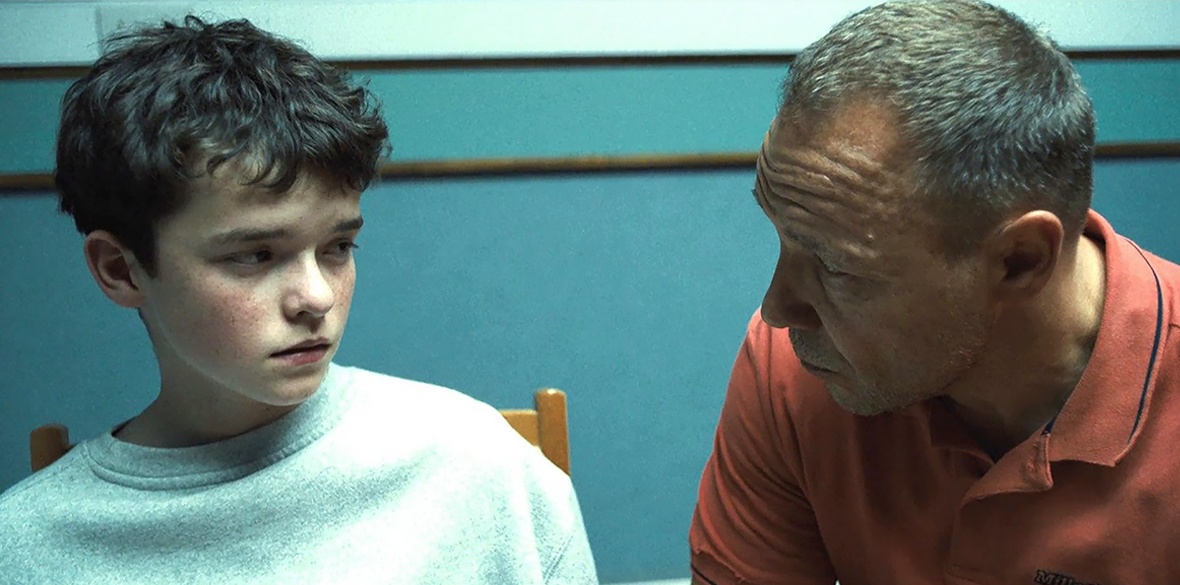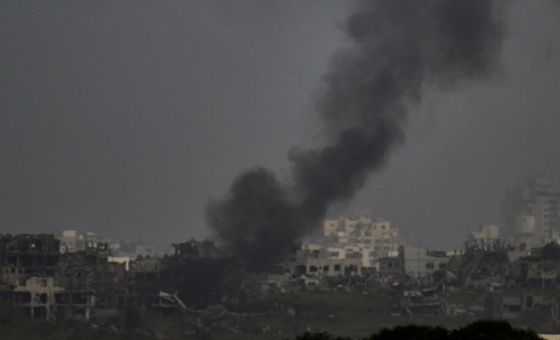This is the last article you can read this month
You can read more article this month
You can read more articles this month
Sorry your limit is up for this month
Reset on:
Please help support the Morning Star by subscribing here
ADOLESCENCE, Netflix’s four-part single-take, real-time series about a school-boy knifing, is the streamer’s most popular series of all time in Britain and in many other parts of the world. It has been hailed by critics as a television breakthrough and endorsed by Prime Minister Keir Starmer, who not only watched it at home with his kids but wants it viewed in all British schools.
There are multiple subjects which the series embraces, including: a generation reared on the internet that is media savvy and relationship ignorant; the deterioration of the public school system; and the class system as evidenced in episode three’s confrontation of its working-class adolescent who marks out the privileged or “posh” status of a police psychologist.
But its main focus, and the lens through which all of these subjects is refracted (as is made painfully obvious in episode four) is male violence, passed on through generations and perpetrated against women.
There are some excellent scenes and fine points made by the series on that score including the psychologist’s confrontation of the boy Jamie. There the connection is made between the way he converts his fear of women and inability to communicate with them into rage, and the explosion of his father Eddie (Stephen Graham, the show’s co-creator).
In the series’s ultimate moment, after beating a young neighborhood hooligan, Eddie explains that his father beat him and he was proud to have not carried on that tradition by never touching his son. To which his wife replies that, in light of the tragedy and of his own continuing angry eruptions, that that effort was “not enough.” It gives the lie to a confession that has become a cultural and media trope, rationalising and sanctioning psychological violence.
The problem is that all of this is itself filtered through a class lens, with the villain and source of violence in the society being not just “masculinity” in the abstract, but male working-class men and the boys they raise.
Societal institutions are presented as fair minded in the extreme, but unable to cope with this lashing out by the “other” in their midst.
For sure the series, and this is not remarked upon by the characters, also participates in racial coding. When JD Vance recently visited Britain he evoked, as part of his far-right, anti-immigration agenda, the spectre of Muslim gangs knifing the populace. As everyone in Hollywood and in US politics will tell you, if you want to raise that spectre in the “liberal” climate, the way to do it and get away with it is to present the problem but through the eyes of a white protagonist. The dog whistle then still pierces the ears of those attuned to it but there is plausible deniability on the part of the creators who, in the case of this show, claim it was based on an actual incident involving white teens.
In episode one, after the initial breaking into the house by police is seen through the eyes of a detective inspector, detailing the laborious ways the police are scrupulously observant of the laws favouring suspects, but leaving open the question of what the boy’s treatment would be like if he were not white.
Episode two, though describing a breakdown in civility in the school system, does not place the blame on the years of austerity by first the Conservative and now Starmer’s Labour government. Rather the problem is those unruly students: “the kids,” who in the words of one teacher “have no feelings.”
Episode three, which locates or rather traps the audience in the interrogation room for almost the entire episode, through Jamie’s criticism of the psychologist, acknowledges the class differences but ultimately comes down on the side of his naked and scary brutality.
This episode also is the most blinkered in its presentation of the “working-class” problem. Its men — of course in the elitist neoliberal view — are mainly violent creatures, while the assigned role of its mostly passive and victimised women is to socialise this violence. This characterisation leaves out the ability of both working-class men and women to work together to channel this energy against the elites and for their rights, with women, historically, often in the forefront of British struggles for equality.
There is a long history in Western societies of “othering” adolescents and the terrors their untrained or unindoctrinated minds can conjure, taking in comic books, rock ‘n’ roll and horror films, all forms which equally have rebellious anti-capitalist aspects.
A word about the style, so pronounced in the series. The long take — the refusal to cut a scene up into its component parts — is an old and revered trope in the cinema. It is usually attributed to leftist cinema beginning with Jean Renoir’s The Crime of Monsieur Lange (1936) about the devastation wreaked by an owner on his workers, La Marseillaise (1938) about the French revolution, and Rules of the Game (1939) a minute examination of the ultimately deadly “foibles” of the aristocratic class.
This series on the other hand, though it purports to be in the tradition of both the long take and the British “Angry Young Men” social cinema of the late 1950s and early ‘60s uses this trope of hyper-realism to disguise its elitist gaze. It is, in fact, anti-working class and anti-left. That is: the refusal to cut, instead of opening up a world, closes it off and does not provide a context for its attack on a specific class, thus posing its aggressive behavior as ultimately beyond explanation.
No doubt Starmer, the anti-working class head of what he still chooses to call the “Labour” Party and who purged it of its radical Jeremy Corbyn-led elements, when watching at home with his kids was eager to demonstrate to them that working-class anger was something they should condemn. He was probably much more comfortable with a work that only features such anger lashing out at women instead of combining across racial and gender lines to unionise and erupt at figures like himself, whose own political austerity programme creates the conditions for that anger.
The Starmers of the world then sit back, “tsk-tsk”, and wave their hands like Dr Frankenstein as they watch what are, in their eyes, these “deteriorating creatures” running amuck.
Adolescence: not a TV verite masterpiece, but a display of anti-working-class liberal pretentiousness.
Dennis Broe is a professor of film and television who has taught at the Sorbonne. His books on television include: Birth of the Binge, Serial TV and the End of Leisure; Diary of a Digital Plague Year, Corona Culture, Serial TV and The Rise of the Streaming Services; and Maverick or How The West Was Lost. He is also a novelist whose latest book about McCarthyism in ’50s Hollywood is The Dark Ages.










